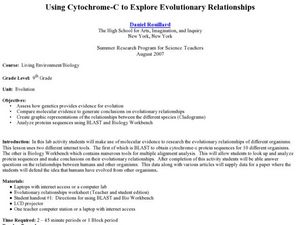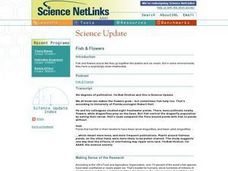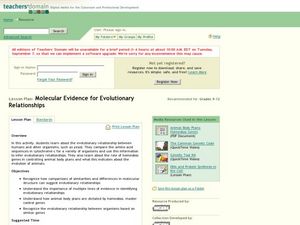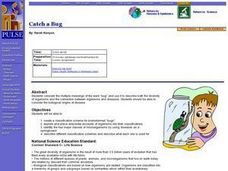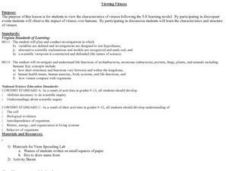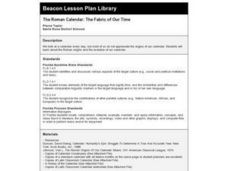Curated OER
The Opposable Thumb
Students explore the physical importance of the opposable thumb among primates. They discover which of their simplest daily activities are possible only because of their opposable thumbs.
Curated OER
Civil Liberties and War Powers: Korematsu v. United States
Eleventh graders compare and contrast Supreme Court decisions dealing with the application of civil rights during times of war, with emphasis on discrimination and detention. Working in groups, 11th graders review cases and analyze how...
TED-Ed
A Brief History of Religion in Art
Did you know that some languages have no word for art? The English language does and the narrator of this short video discusses the aesthetic dimension of religious art as it "visually communicates meaning beyond language."
Cold Spring Harbor Laboratory
Some DNA Does Not Encode Protein
Roy John Britten easily earned a PhD in nuclear physics—but he found painting with water colors too difficult. Young scientists learn about Britten's life, career, and research with an online interactive. They read a biography, view...
Utah Education Network (UEN)
Utah Open Textbook: 7th Grade Science
Physical and biological factors affect everyday living. Scholars explore electromagnetic forces, motion, the rock cycle, and geological changes. They examine cells as the building blocks of life and how organisms reproduce using images...
CK-12 Foundation
CK-12 Earth Science Concepts for Middle School
Explore a variety of science concepts in an interactive textbook created for middle school scholars. A lengthy table of contents takes readers to pages comprised of a subject overview, outline, and summary. Follow links further to find...
Curated OER
From Genes to Memes
Pupils explore changes in evolution. In this evolution instructional activity, students define genes and memes. Pupils read an article to recognize the difference between genes and memes. Students explain what a meme is and what factors...
Curated OER
Hominoid Cranium Comparison
Learners describe, measure and compare cranial casts from contemporary apes (chimpanzees and gorillas, typically), modern humans and fossil "hominids" (erect and bipedal forms evolutionarily separated from apes).
Curated OER
Using Cytochrome-C to Explore Evolutionary Relationships
Young scholars analyze protein sequences. In this lesson on determining evolutionary relationships, students use the Internet tools BLAST and Biology Workbench to look at protein sequences. Young scholars will compose an essay that...
Curated OER
Fish and Flowers
Students read and discuss a research article that explains the unlikely link between increased fish populations and increased plant pollination. They answer reading guide questions to discover this ecological relationship.
Curated OER
Molecular Evidence for Evolutionary Relationship
Students investigate the relationship between humans and yeast. In this evolution lesson plan, students compare amino acids in a variety of life forms. Students will watch films on similarities of the genetic code that structures an...
Curated OER
Global Warming Is Human Made
In this environmental awareness worksheet, students read an article about the causes of global warming. Students then answer seven true or false questions, 10 10 synonym matching questions, and ten phrase matching questions based on the...
Curated OER
Arsenic and Human Health
Ninth graders concentrate on arsenic poisoning as an example of the connections among health, geography, and geology as they develop a persuasive presentation about the dangers of arsenic in the drinking water, targeting a specific...
Curated OER
The Birth of a Rocky Mountain City and Railroad: Georgetown and the Loop Railroad
Students explore the evolution of a town. For this social studies lesson, students discuss why Georgetown and the Georgetown Loop Railroad were developed and discuss life as a prospector. Students write a letter explaining what life is...
Curated OER
Pseudogene Suite
Students use Biology Workbench to explore DNA sequence data for the GULOP gene in humans, chimpanzees, orangutans, and crab-eating macaques and the beta globin gene and its pseduogene in humans, gorillas, and chimpanzees.
Curated OER
Archaeological Study
Students analyze the difference between archaeology and anthropology while studying the evolution of different products. In this archaeology and anthropology lesson, students trace the progression of a certain tool or product and come up...
Curated OER
Molecular Evidence for Evolutionary Relationships
Students compare the amino acid sequences in cytochrome-c for a variety of organisms and use this information to infer evolutionary relationships. Students investigate the role of homeobox genes and what this indicates about the...
Curated OER
Floods: Rising Waters and You
Students examine the relationship between human-made structures, flood waters and the increasing population through video clips, websites and a lab experiment.
Curated OER
Disease and Epidemics
High schoolers explore how the study of diseases, epidemics and disease management offers opportunities for exploration of biological evolution, immune systems, interaction between humans and their environment, and interaction among...
Curated OER
Lighting Our Way
Students read a variety of web-based articles to explore the history of human understanding of light. They investigate light waves and read about the work of Albert Einstein.
Curated OER
Viewing Viruses
Students view the characteristics of viruses following the 5-E learning model. By participating in discrepant events Students observe the impact of viruses over humans. By participating in discussion students examine the characteristics...
Curated OER
The Roman Calendar: The Fabric of Our Time
Fourth graders explore the Roman origins and evolution of our calendar.
Curated OER
Sexual Selection in the Animal Kingdom
Students research how sexual selection plays a role in driving evolution. They experiment how variation exists within not just obvious physical traits, but metabolically and behaviorally. They write a letter describing a problem, and a...
Curated OER
Trouble in the Troposphere
Students create graphs using NASA data, compare ozone levels of several U.S. cities, analyze and evaluate the data and predict trends based on the data, and discuss and describe how human activities have modified Earth's air quality.
Other popular searches
- Human Evolution Webquest
- Stages of Human Evolution
- Human Evolution Cladogram
- Human Evolution Chart
- Human Evolution Web Quest
- Human Evolution Skull
- Human Evolution Food Chain
- Evidences of Human Evolution
- Human Evolution Skull Lab
- Human Evolution Cardiogram
- Human Evolution Dogs
- Human Evolution Time Line










